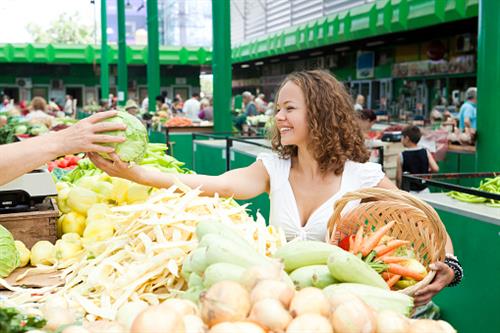Explore our blog featuring articles about farming and irrigation tips and tricks!
Why The High Price Tag On Organic Food?

No pesticides. No herbicides. No chemical fertilizers. No harmful growth hormones or needless antibiotics.
What’s not to like about organic food?
Well, maybe the price tag. While estimates can vary depending on the season and area of the country, the USDA estimates that organic food can cost anywhere from 10 to 30 percent more than conventionally raised food. Of course, many people feel that the cost is worth it. However, those who are on very tight budgets or those with large families may wonder whether the organic label is a marketing gimmick and some shyster is taking advantage of them. They may wonder exactly why organic food is so expensive.
However, there are several logical reasons for the higher cost of organic food. Let’s take a look.
More Hands on Work
First, organic food producers have strict regulations on the chemicals that they can use on their farms. They cannot spray the sides of their fields with Roundup to kill the brush on it, so someone has to mow the weeds and brush that grow up there. When an insect infestation hits, they cannot spray pesticides on the veggies to save the crop. Sometimes, insects have to be hand-picked, and other times, the infested plants are simply destroyed. Weeds in the field have to be cultivated away, rather than sprayed away, meaning that someone has to spend a lot of time on a tractor. All of these facts mean that organic farming is much more labor-intensive than conventional farming methods.
Working Within Natural Limitations
Organic farmers have to work within the natural limits of their farms. They do not have the option of using nitrogen-rich chemical fertilizers, so their fields will not be quite as productive as the other farmers using bags of petroleum-based fertilizers. They end up using compost and animal manure in their fields, and they have to rotate their fields to keep them productive. While these methods are great for the Earth, they just are not as productive as conventional farming practices. Additionally, organic farmers, because of the hands-on nature of their farming style, cannot own enormous farms producing millions of bushels of produce each year. There just are not enough hours in a day for them to own these large mega-farms since they have to perform so much more physical labor to produce food. This means that organic farmers cannot practice the economies of scale that mega-farmers can do.
Certification and Regulations
Organic farmers have to follow strict regulations and guidelines to maintain their certification. In fact, the certification process itself is fairly expensive. On top of the day to day work of farming, organic farmers have to create a paper trail that documents the safety of their food. In fact, if a neighboring farm is not organic, the organic farmer has to keep a close watch on the neighbor’s practices to make sure that the organic farmer’s “green” status is not endangered.
Limited Supply
The law of supply and demand says that when a supply of a product is limited, the prices will go up. Organic produce is such a small part of the food supply, that prices do go higher. Additionally, organic farmers still have to package, market, and transport their crops after harvest. With each harvest, these costs can be figured “per unit.” Since an organic farmer has fewer “units” of food than conventional farmers and the costs for post-harvest handling are still the same, each “unit” is pricier.
To put it simply, organic farmers have the goal of producing crops in an ethical, safe, and Earth-friendly way – and with this goal comes a price. However, it is much easier for some people to pay the higher price for groceries when they understand exactly why these foods are significantly more costly at the grocery store.
Stay up to date on all T-L news and get alerts on special pricing!


